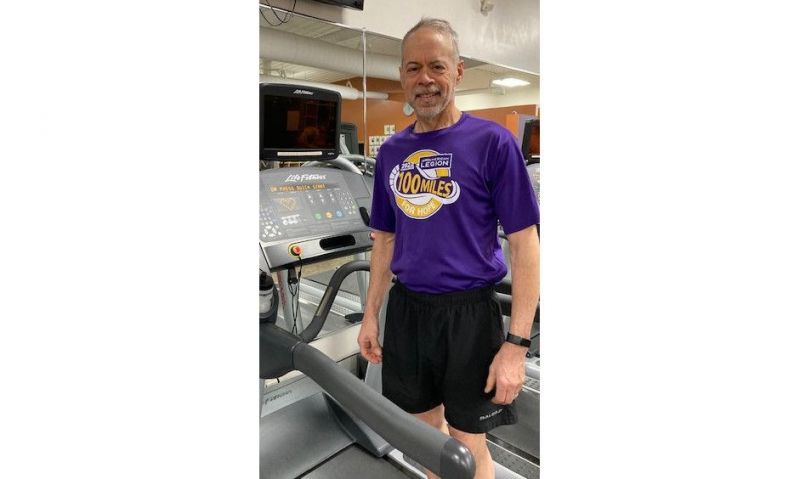
Running 100 miles per month, American Legion member takes annual fitness/wellness campaign ‘to heart.’
After about 30 years in the Navy, Brian Wenger moved back to his hometown of Elgin, Iowa, to help his son with the century-old family farm.
“Originally, when I moved here, I thought of sustaining the organizations, sustaining the farming operation, but I think it's really turned into trying to sustain myself,” said Wenger, a member of American Legion Post 352 in Elgin.
Wenger has a congenital issue that affects his heart valve. Surgery may be an inevitability. In 2021, he had it scheduled. Only a week before, the surgeon decided the issue “probably wasn't quite as bad as what he originally thought.” The procedure was postponed, but the uncertainty remains.
“It was really affecting my outlook on things and just my lifestyle,” Wenger said. Doctors told him that when the time comes to have the surgery, being in “good shape” will aid his recovery. “So I took that to heart — no pun intended — and put myself on a regimen that I started in January.”
This year, Wenger took advantage of the VA’s offerings for lifestyle and nutrition support. He gave up drinking alcohol. And, a few times a week, he wakes at 4:30 a.m. to run at the gym.
In support of his health, Wenger is participating in 100 Miles for Hope, a fitness/wellness event in which participants log 100 miles by Labor Day as they fundraise for The American Legion Veterans & Children Foundation (V&CF). All proceeds from registrations and donations go directly to supporting disabled veterans and military families. (Learn more and register for the third annual challenge here.)
Wenger’s personal goal is to run 100 miles per month between March and September, a goal he exceeded in March and April.
Wenger said he’s been a recreational runner off and on for about 40 years. He ran track in high school, but never took it seriously or trained. He really became invested in running at age 25 in preparation for Officer Candidate School (OCS), he said. He’d been informed that if he couldn’t pass the physical fitness test, which included a running component, he’d be put in remedial training. He was scheduled to begin OCS in January 1984.
“I remember Christmas Eve we were still in Iowa. They canceled Christmas Eve services at church because it was too cold,” he said. “There was no gym around to prepare for all this, so I'm out running in this 10-below zero temperatures trying to get ready.”
He passed. Throughout his Navy career, there were years he did well on semi-annual physical fitness tests and years, mostly toward the end, he struggled, Wenger said.
He went through the VA MOVE! program, which helped, until he moved back to a rural area, he said, where he “just couldn’t find a way to work the fitness part in” to his new life as a farmer and retiree. But as of 2022?
“I’m back on it again,” he said, laughing.
Already, he’s seeing progress. He’s increased the treadmill incline and his pace. When he recommitted to exercise and nutrition goals in January, he was running a 9-minute mile for about 25 to 30 minutes. By the end of April, he could run 55 minutes and was closing in on a pace of 8:20 per mile. Someday, he’d like to break an 8-minute mile.
“Now, January wasn't all that good. It was a tough month just getting back into it,” Wenger said. But overall, he added, he’s surprised about how good he feels.
“Actually, I don't know when I’ve felt as good for this long of a period of time running.”
Since the beginning of the year, he’s lost some weight and increased his energy (although if he stops moving after dinner, he admits to “doing the fade”). Returning to running has also affected his outlook, especially putting off dreams for another day.
“I remember (thinking), ‘Oh, I'll get to that. I'll start that program. I'll start getting more active.’ And I never would. It was like, ‘Hey, you need to do this now,’ in talking to myself. …
“That spills over into a lot of things: You think about it, want to do it. Let's do it! Rather than just think about it, make it happen,” he said.
This year, Wenger has put more effort into fundraising, he said, learning more about V&CF and reaching out to community groups, which has further contributed to the meaning he derives from the challenge.
“There are so many things in our lives that we can't control,” Wenger said. “But there's a whole lot you can, and when you do those things, I think it really makes you feel like, ‘Hey, I'm pretty good. I'm OK, I can take care of things. I can't maybe do everything I want to do, but there are a lot of things I can do.’ So why not? Why not take action and be proactive and feel good about yourself?”
- 100 Miles

